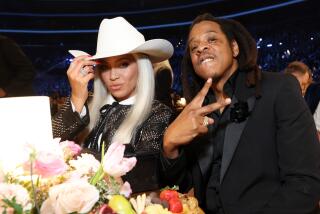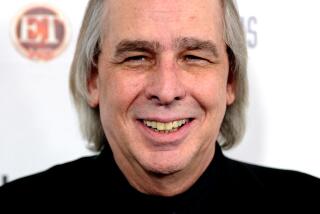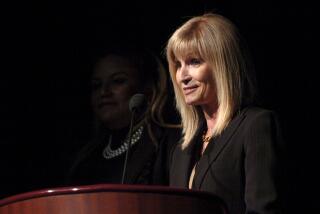HEAVY-METAL FANS--NOW THEY’VE GOT THE KNAC
- Share via
“It’s really a disgrace,” a young music fan told us the other night. “My favorite bands headline the Forum, sell millions of records and yet I never hear them on album-rock radio at all. It’s like they’re banned or something.”
Coming from a black music fan, this charge would be perfectly understandable. After all, for years rock radio has virtually ignored black artists, even showing enormous reluctance when it came to playing “Sun City,” one of the year’s most inspiring singles.
For the record:
12:00 a.m. Feb. 2, 1986 IMPERFECTIONS
Los Angeles Times Sunday February 2, 1986 Home Edition Calendar Page 91 Calendar Desk 2 inches; 63 words Type of Material: Correction
NEW KNAC, OLD KNAC: The change in format at KNAC from alternative rock to the heaviest of metal has brought us much scrawled outrage--from both sides. For the lost legion of ex-KNAC listeners, however, we offer the solution posed by Richard Wagoner of UCLA’s campus radio station KLA: Listen to his station, which is patterned after the old KNAC. The catch, of course, is that to get KLA you have to be a subscriber to Group W Cable and ask for an FM hook-up.
IMPERFECTIONS
Los Angeles Times Sunday February 2, 1986 Home Edition Calendar Page 91 Calendar Desk 1 inches; 36 words Type of Material: Correction
Patrick Goldstein’s Pop-Eyeings notwithstanding, Rush is not a heavy-metal band, writes a rather annoyed James Kahn of Hacienda Heights. Popsters interested in this controversy can read Dennis Hunt’s interview with Rush’s Geddy Lee on Page 70.
But the real surprise here is that this complaint didn’t come from a black music fan, but from a heavy-metal fanatic. And what’s more--local headbangers have a legitimate gripe. Many of 1985’s biggest-selling albums were from heavy-metal bands, including Iron Maiden, Motley Crue, Ratt, Dio and the Scorpions. And over the next six weeks, a quartet of metal warriors--Kiss, Twisted Sister, Aerosmith and Rush--will all be headlining the biggest halls in town.
Yet before KNAC-FM abruptly switched over to a heavy-metal format earlier this month, there wasn’t a legitimate 100% hard-rock station in the entire country. Worse still, it’s almost impossible for heavy-metal bands to get heavy air play on most album-rock stations around the country either.
KNAC’s format change has caused an uproar, especially among listeners who had loyally supported the Long Beach-based station’s eclectic, alternative-rock play list. There have been numerous complaints and even threats of listener boycotts. As one longtime KNAC fan put it: “As an educated 30-year-old, with a considerable disposable income, I’d think the station would rather have me as a listener than three teen-agers from Placenta who do bad drugs.”
Yet KNAC’s programming move has clearly filled a void caused by the current demographics of radio, which find rock stations avidly courting older listeners who attract hefty ad dollars.
“We looked at the other stations in the marketplace, who had basically turned their backs on hard rock, and we felt it was time to blow some windows out around here,” said KNAC program director Jimmy Christopher, who designed the new format with the help of Jeff Pollack Communications, an influential radio consultancy firm.
“I’ve been talking to some of our older listeners and trying to get them to hang around and be open-minded about the new format, but we felt that by staying with alternative music for six years, that we gave it a good shot.”
According to Jeff Pollack, KNAC’s status as a small station with relatively low ratings gave the new team an opportunity to go after younger listeners, even if they are no longer the ad industry’s most sought-after demographic group. “We don’t have any enormous expenses running the station,” Pollack said. “So I think we can rely more on word-of-mouth at first than big ratings. We also feel we can still attract plenty of advertisers who want to reach a younger, 16-to-24-year-old audience, which buys an enormous amount of consumer products.”
The KNAC format switch has clearly overjoyed one key group of listeners--the army of record execs who see radio exposure as an important tool in boosting heavy-metal album appeal.
“I think the move is definitely going to have a major impact on record sales,” said Geffen Records A&R; exec Tom Zutaut, who signed several popular heavy-metal bands, including Motley Crue and Dokken, during his stint as an A&R; exec at Elektra Records. “It gives us an outlet to expose a type of music that appeals to active listeners, who are exactly the kind of listeners who buy records.
“It’s been really frustrating to see bands that sell more than a million albums not be able to get played on the radio anywhere in this town. Rock radio here has become very stale and predictable, and I think you’re going to see both KLOS-FM and KMET-FM forced to play a lot more real rock records now. This is going to make things very exciting again.”
More to Read
The biggest entertainment stories
Get our big stories about Hollywood, film, television, music, arts, culture and more right in your inbox as soon as they publish.
You may occasionally receive promotional content from the Los Angeles Times.










